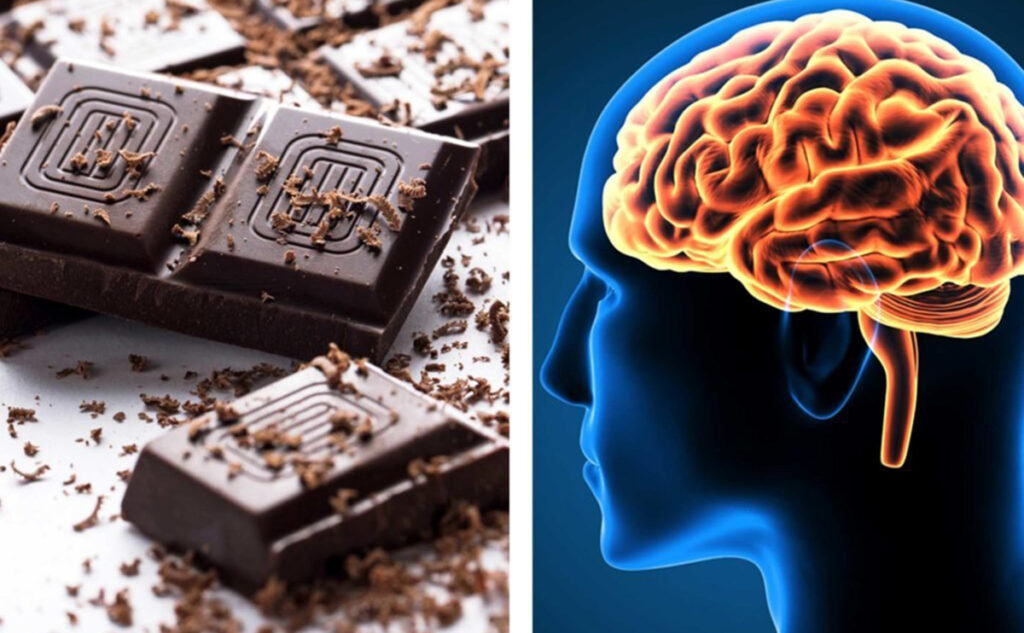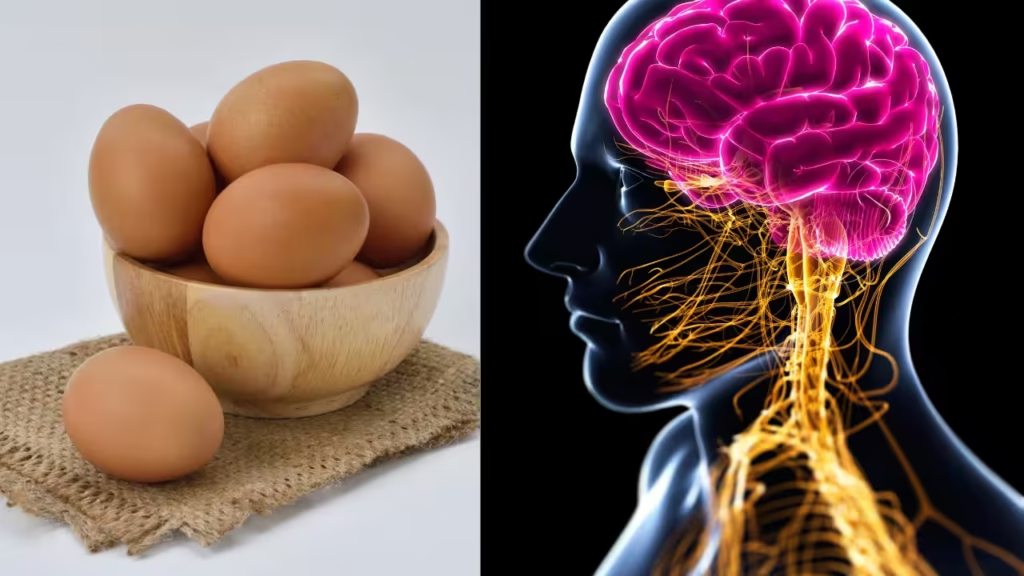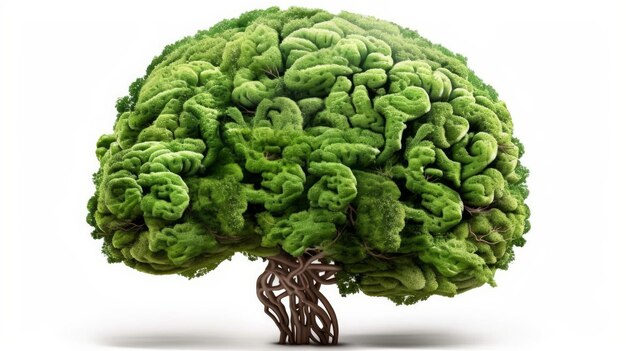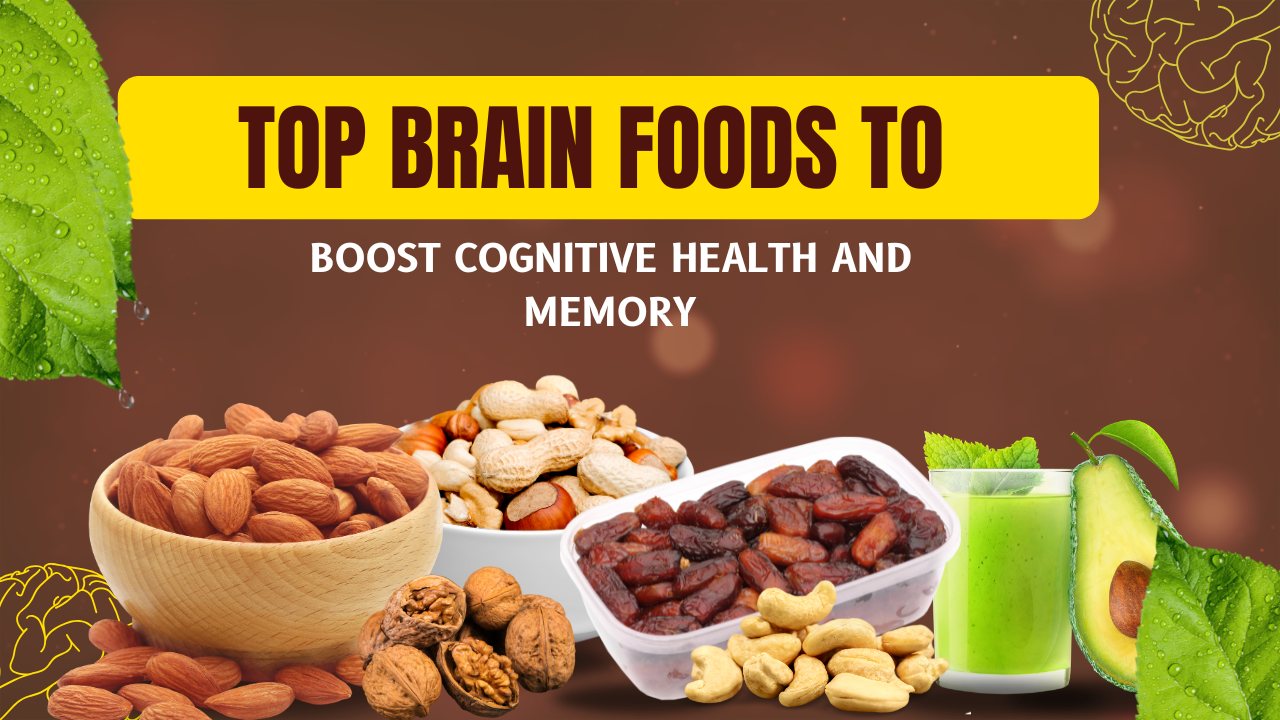The human brain is one of the most complex and powerful organs in the body. It regulates every aspect of our lives—thoughts, memory, emotions, motor skills, breathing, temperature, and countless other functions. Despite accounting for only about 2% of our body weight, the brain consumes approximately 20% of the body’s energy. That alone highlights how crucial proper nutrition is to maintaining and enhancing brain health.
As we strive for productivity, creativity, emotional balance, and mental clarity in today’s fast-paced world, taking care of our brain has never been more important. Fortunately, one of the most effective ways to protect and boost our cognitive abilities is also one of the simplest: through the food we eat.

Understanding Brain Health
Brain health refers to the brain’s ability to function optimally across multiple cognitive areas, such as memory, decision-making, learning, and emotional regulation. A healthy brain can process information effectively and adapt to new challenges, ensuring overall mental well-being. It also plays a crucial role in emotional balance, helping manage stress, anxiety, and other emotional responses.
Maintaining good brain health is essential for resilience against aging and neurodegenerative diseases, like Alzheimer’s, Parkinson’s, and dementia. To support brain function, incorporating brain food into your diet can be highly beneficial. These foods are rich in nutrients that nourish the brain, improve cognitive function, and protect against mental decline. Eating a balanced diet with brain-boosting foods can enhance memory, focus, and overall mental sharpness, supporting long-term cognitive health.
Why Is Brain Health Important ?
Cognitive Performance: The brain’s ability to think clearly, learn efficiently, and solve problems effectively is crucial for daily functioning. A well-nourished brain supports improved focus, quicker decision-making, and better overall cognitive performance, making tasks easier to handle and learn.
Emotional Balance: The brain plays a central role in regulating emotions, mood, and behavior. When the brain functions optimally, it helps prevent mental health issues such as depression and anxiety, fostering emotional resilience and stability. A healthy brain enables better stress management and emotional well-being.
Memory Retention: Memory is essential for everything, from completing everyday tasks to achieving long-term goals. Proper brain nutrition helps enhance both short-term and long-term memory, improving retention and recall. A well-functioning brain ensures you can remember important information and make better decisions.
Disease Prevention: Chronic inflammation and oxidative stress are major contributors to brain aging and neurological diseases like Alzheimer’s and Parkinson’s. Healthy dietary choices rich in antioxidants, vitamins, and healthy fats can reduce these risks, promoting long-term brain health and preventing cognitive decline.

Quality of Life: Everything from communication to coordination and decision-making is controlled by the brain. A healthy brain is essential for maintaining a high quality of life, allowing for smooth interactions with others, physical coordination, and overall well-being. It helps maintain independence and enhances daily functioning.
Top 10 Brain Foods That Boost Mental Function
Fatty Fish
Examples: Salmon, mackerel, sardines, trout, and tuna.
Why It’s Good for the Brain:
Fatty fish, such as salmon, mackerel, and sardines, are excellent sources of omega-3 fatty acids, particularly DHA (docosahexaenoic acid). DHA is a key structural component of the brain, essential for maintaining brain health.
As part of a balanced diet, these omega-3s are vital brain food, supporting the building and repair of brain and nerve cells. Omega-3s help improve cognitive functions such as learning, memory, and overall brain performance. Including fatty fish in your diet regularly can enhance brain function and contribute to long-term mental health and clarity.
Benefits:
Enhances memory and cognition
Reduces risk of Alzheimer’s and dementia
Supports mood stability and emotional health
How to Use:
Include fatty fish in your meals 2–3 times per week
Use grilled, baked, or steamed recipes for maximum health benefits
Blueberries
Blueberries are packed with antioxidants, especially anthocyanins, which are known for their strong anti-inflammatory and antioxidant properties. These compounds are essential brain food, as they help protect the brain from oxidative stress.

The anthocyanins in blueberries accumulate in the brain, where they enhance communication between brain cells. This improved cell communication can boost cognitive function, memory, and overall mental clarity. Including blueberries in your diet regularly supports brain health and helps maintain optimal brain function as you age.
Why It’s Good for the Brain:
Benefits:
Delays brain aging
Improves memory and learning
Reduces oxidative stress
How to Use:
Add to smoothies, cereals, salads, or enjoy as a snack
Combine with yogurt for a brain-boosting breakfast
Broccoli
Broccoli is rich in antioxidants and vitamin K, making it an excellent brain food for supporting brain health. Vitamin K is a fat-soluble nutrient that plays a crucial role in the formation of sphingolipids, which are essential components of brain cells.
By aiding in the creation of these important lipids, broccoli helps maintain healthy brain cell function. Consuming this vegetable regularly can improve cognitive performance and protect against age-related cognitive decline. Adding broccoli to your diet provides essential nutrients that nourish the brain and promote overall mental well-being.
Why It’s Good for the Brain:
Benefits:
Enhances brainpower
Protects against cognitive decline
Reduces inflammation
How to Use:
Steam or stir-fry with olive oil
Add to soups, pasta dishes, or casseroles
Dark Chocolate
Dark chocolate is a delicious brain food packed with flavonoids, caffeine, and antioxidants. The flavonoids found in dark chocolate help improve blood flow to the brain, enhancing overall brain function.

This increased blood flow can boost memory, attention span, and problem-solving skills, making dark chocolate a tasty and effective way to support cognitive health. When consumed in moderation, dark chocolate provides essential nutrients that promote brain activity, helping to sharpen focus and mental clarity.
Why It’s Good for the Brain:
Benefits:
Enhances mood
Improves cognitive function
Stimulates brain plasticity
How to Use:
Choose dark chocolate with at least 70% cocoa
Enjoy a small square as a daily treat
Nuts and Seeds
Examples: Walnuts, almonds, flaxseeds, sunflower seeds, chia seeds.
Why They’re Good for the Brain:
Nuts and seeds are nutrient-dense brain food that provide a wealth of omega-3 fatty acids, antioxidants, vitamin E, and magnesium. These essential nutrients are known to support overall brain health and improve cognitive function.
Omega-3s help with brain cell communication, while antioxidants protect the brain from oxidative stress. Vitamin E and magnesium further enhance mental clarity and memory. Regular consumption of nuts and seeds can help nourish the brain, improve focus, and protect against age-related cognitive decline, making them an excellent addition to any brain-boosting diet.
Benefits:
Protects against age-related cognitive decline
Supports mood and brain function
Regulates blood pressure and improves blood flow to the brain
How to Use:
Add to salads, oatmeal, or yogurt
Use nut butters as a healthy spread
Eggs
Why They’re Good for the Brain:
Eggs are an excellent brain food rich in essential nutrients that support cognitive health. They contain vitamins B6 and B12, folate, and choline, all of which play important roles in brain function.

Choline, in particular, is vital for producing acetylcholine, a neurotransmitter involved in memory and learning. By including eggs in your diet, you can enhance memory, improve learning abilities, and support overall brain health. These nutrients help maintain optimal brain function and protect against cognitive decline, making eggs a powerful addition to a brain-boosting diet.
Benefits:
Enhances memory
Supports mental development
Boosts neurotransmitter production
How to Use:
Eat boiled, poached, or scrambled
Add to sandwiches or make a nutritious omelet
Whole Grains
Whole grains are an excellent brain food, providing a steady supply of glucose, which is the brain’s main energy source. Unlike refined carbs, whole grains release glucose slowly, ensuring a continuous energy flow to the brain throughout the day.
This slow release of glucose helps maintain stable energy levels, supporting focus, concentration, and overall cognitive function. Including whole grains in your diet, such as oats, quinoa, and brown rice, can improve mental clarity and support long-term brain health, making them an essential part of a brain-boosting diet.
Examples: Oats, brown rice, quinoa, whole wheat, barley.
Benefits:
Supports concentration and focus
Reduces risk of mental fatigue
Improves blood flow to the brain
How to Use:
Start your day with a bowl of oatmeal
Use whole-grain bread and pasta instead of refined options
Leafy Greens

Examples: Spinach, kale, collard greens, Swiss chard.
Why They’re Good for the Brain:
Leafy greens are packed with brain food nutrients such as vitamin K, lutein, folate, and beta carotene. These essential nutrients play a vital role in supporting brain health and protecting against cognitive decline.
Consuming leafy greens regularly helps maintain mental clarity, improve focus, and support overall brain function. The combination of vitamins and antioxidants in these vegetables helps protect the brain from oxidative stress and promotes long-term cognitive health. Including leafy greens like spinach, kale, and collard greens in your diet can significantly enhance brain performance and slow age-related mental decline.
Benefits:
Delays aging of the brain
Enhances memory and learning
Reduces risk of neurodegeneration
How to Use:
Add to salads, soups, and smoothies
Use as a base for wraps or bowls
Avocados
Avocados are a powerful brain food, packed with healthy monounsaturated fats that play a crucial role in supporting brain health. These healthy fats help improve blood flow to the brain, which is essential for optimal cognitive function. Proper blood circulation ensures that the brain receives the oxygen and nutrients it needs to perform efficiently.
In addition to promoting better circulation, the monounsaturated fats in avocados also help reduce blood pressure, which is a key factor in maintaining brain health. By keeping blood pressure within a healthy range, avocados help reduce the risk of stroke and other cognitive impairments. Including avocados in your diet can enhance brain function, improve memory, and support long-term mental well-being.
Why They’re Good for the Brain:
Benefits:
Improves focus and concentration
Supports overall brain function
Rich in folate and vitamin K
How to Use:
Add slices to salads and sandwiches
Make guacamole or add to smoothies
Conclusion

Brain foods play a vital role in supporting cognitive function, memory, and mental clarity. Nutrient-rich options like fatty fish, blueberries, eggs, leafy greens, and nuts provide essential vitamins, antioxidants, and healthy fats that help the brain work efficiently and stay protected from damage.
These foods not only enhance focus and learning but also reduce the risk of age-related conditions such as Alzheimer’s and dementia. By reducing inflammation and improving blood flow to the brain, they help maintain long-term mental well-being.
Including brain-boosting foods into your daily routine is a simple yet powerful step toward a healthier mind. Combined with regular exercise, good sleep, and stress management, a brain-friendly diet can help you stay sharp, focused, and mentally strong throughout life. Your brain deserves the best fuel to function at its peak.
FAQs
What is brain food ?
Brain food refers to foods that provide essential nutrients that support brain health, enhance cognitive function, and protect against neurodegenerative diseases. Examples include fatty fish, nuts, berries, leafy greens, and whole grains.
How can brain food improve memory ?
Brain foods rich in omega-3 fatty acids, antioxidants, and vitamins help improve memory by supporting brain cell function, reducing inflammation, and enhancing communication between brain cells.
What are the best brain foods for focus and concentration ?
Foods like blueberries, fatty fish, eggs, and leafy greens are excellent for improving focus and concentration due to their high levels of nutrients that support brain function and energy levels.
Can brain food prevent cognitive decline ?
Yes, many brain foods, especially those rich in antioxidants and omega-3s, can slow cognitive decline and protect against diseases like Alzheimer’s and dementia.
Is it necessary to eat brain food every day ?
While not required every day, regularly consuming brain foods as part of a balanced diet can provide long-term cognitive benefits and support overall mental well-being.


